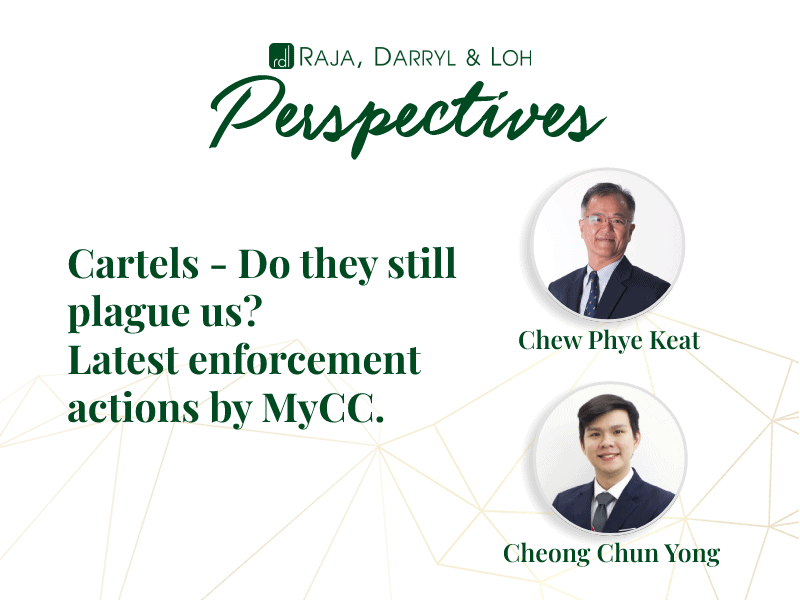Fast approaching a decade since the Competition Act, 2010 (“Act”) first came into force on 1 January 2012, companies (otherwise referred to as “enterprises” in the Act) by now should know or at least be aware of the risks of engaging in anti-competitive conduct prohibited under the Act, and in particular -the chief of all such evils – being part of a cartel. Indeed, from available records, out of the 10 cases so far in which the Malaysia Competition Commission (“MyCC”) has issued a finding of infringement under the Act, 8 of them were on cartel behaviour.
What is a Cartel?
As provided by the Directorate-General for Competition of the European Commission, “A cartel is a group of independent companies which join together to fix prices, to limit production or to share markets or customers between them. Cartelists can also collude on product quality or innovation. … Instead of competing with each other, cartel members rely on one another’s agreed course of action, which reduces their incentives to provide new or better products and services at competitive prices or conditions.” – Cartels, Competition Policy, European Commission https://ec.europa.eu/competition-policy/cartels_en
In the Malaysian context and following closely to the above description, cartels arise from prohibited horizontal anti-competitive agreements which in Section 4(2) of the Act are explained as follows:
“… a horizontal agreement between enterprises which has the object to –
- fix, directly or indirectly, a purchase or selling price or any other trading conditions;
- share market or sources of supply;
- limit or control –
- production;
- market outlets or market access;
- technical or technological development; or
- investment; or
- perform an act of bid rigging,
is deemed to have the object of significantly preventing, restricting, or distorting competition in any market for goods or services.”
That such anti-competitive behaviour is taken very seriously by MyCC is borne out by this quote by Tuan Iskandar Ismail, the Chief Executive Officer of MyCC, in the press release regarding the latest enforcement action by MyCC, namely, action against yet another cartel operating in Malaysia:
“At any rate, cartel is the supreme evil of competition law. All competition agencies in the world have the same view including MyCC. As such, MyCC has always given high priority to the investigation and punishment of anti-competitive agreements, especially price and quota cartels, customer or territorial allocation agreements and bid rigging too. The perpetrators of these cartels, quite literally, are stealing money from the pocket of businesses and consumers,…”
In summary, MyCC had commenced investigations back in 2017 when a whistleblower approached MyCC with information on a cartel formed by 7 warehouse operators (“Parties”). Interestingly, during the unannounced inspections in the various business premises of the Parties carried out by MyCC, it was uncovered that the Parties had created a WhatsApp Chat Group which contained discussions on fixing the surcharges despite acknowledging that they were all competitors in the warehouse services market. It was found that the Parties used the WhatsApp Chat Group as the platform to discuss the imposition of surcharges for handling services for long length and heavy lift of import and export cargoes. To be sure, the WhatsApp Chat Group was not the only evidence gathered during the investigation – MyCC also managed to unearth the Parties’ cartel agreement in the form of a document named ‘Surcharge Memorandum’ that documented the understanding of the Parties that they would all charge the agreed rates effective from 1 June 2017.
Based on the above, the MyCC on 9 August 2021 issued a finding of infringement against the Parties for engaging in a price-fixing cartel in relation to the handling services for long length and heavy lift of import and export cargoes at Port Klang. The grand total amount of penalty imposed on the Parties collectively was RM1,043,012.52.
It is interesting to note that the case was triggered by a whistleblower; it is hoped that this will cause others who are aware of wrongdoings done in secret to come forward to do their civic duty of bringing such deeds to light whilst taking advantage of the provisions of the Whistleblower Protection Act 2010.
It remains to be seen if the Parties will submit an appeal against the decision of MyCC to the Competition Appeal Tribunal. Nonetheless, it is hoped that the case will serve as a stark reminder to the public that such practices will never be condoned by MyCC and, for the sake of the economic wellbeing of the nation, that they will soon become a thing of the past.
Contributed by
Chew Phye Keat
T: 603 – 2632 9873
E: chewphyekeat@rdl.com.my
Cheong Chun Yong
T: 603 – 2632 9925
E: chunyong@rdl.com.my
